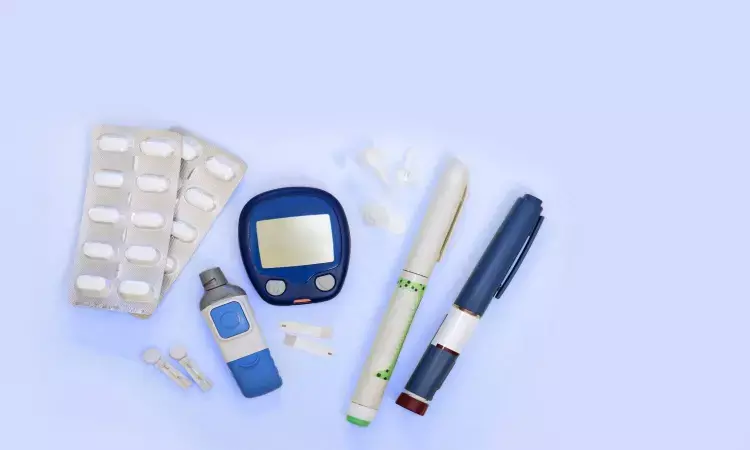- Home
- Medical news & Guidelines
- Anesthesiology
- Cardiology and CTVS
- Critical Care
- Dentistry
- Dermatology
- Diabetes and Endocrinology
- ENT
- Gastroenterology
- Medicine
- Nephrology
- Neurology
- Obstretics-Gynaecology
- Oncology
- Ophthalmology
- Orthopaedics
- Pediatrics-Neonatology
- Psychiatry
- Pulmonology
- Radiology
- Surgery
- Urology
- Laboratory Medicine
- Diet
- Nursing
- Paramedical
- Physiotherapy
- Health news
- Fact Check
- Bone Health Fact Check
- Brain Health Fact Check
- Cancer Related Fact Check
- Child Care Fact Check
- Dental and oral health fact check
- Diabetes and metabolic health fact check
- Diet and Nutrition Fact Check
- Eye and ENT Care Fact Check
- Fitness fact check
- Gut health fact check
- Heart health fact check
- Kidney health fact check
- Medical education fact check
- Men's health fact check
- Respiratory fact check
- Skin and hair care fact check
- Vaccine and Immunization fact check
- Women's health fact check
- AYUSH
- State News
- Andaman and Nicobar Islands
- Andhra Pradesh
- Arunachal Pradesh
- Assam
- Bihar
- Chandigarh
- Chattisgarh
- Dadra and Nagar Haveli
- Daman and Diu
- Delhi
- Goa
- Gujarat
- Haryana
- Himachal Pradesh
- Jammu & Kashmir
- Jharkhand
- Karnataka
- Kerala
- Ladakh
- Lakshadweep
- Madhya Pradesh
- Maharashtra
- Manipur
- Meghalaya
- Mizoram
- Nagaland
- Odisha
- Puducherry
- Punjab
- Rajasthan
- Sikkim
- Tamil Nadu
- Telangana
- Tripura
- Uttar Pradesh
- Uttrakhand
- West Bengal
- Medical Education
- Industry
Polyethylene glycol loxenatide promising for treating diabetes patients resistant or intolerant to metformin

Egypt: A meta-analysis published in Scientific Reports has shed light on the safety and efficacy of polyethylene glycol loxenatide (PEX168), a novel glucagon-like peptide-1 receptor agonist with a longer half-life developed by modifying the exenatide's chemical structure, in type 2 diabetic patients.
The study showed that PEX168 could be a viable option for the treatment of diabetic patients who cannot tolerate metformin or whose metformin control is inadequate.
"The combination of PEX168 at 100 ug and metformin was found to be safe and more effective compared to metformin; however, due to the small number of trials included, these findings should be interpreted with caution, and there is a need for additional trials," the researchers wrote.
Hazem Mohamed Salamah, Faculty of Medicine, Zagazig University, Zagazig, Egypt, and colleagues performed a meta-analysis to summarize the safety and efficacy of PEX168 monotherapy or as an add-on therapy to metformin in patients with type 2 diabetes. Network meta-analysis was used to find the optimal dose.
For this purpose, the researchers searched the online databases from inception till April 25, 2023, for randomized controlled trials (RCTs) comparing PEX168 therapy alone or in combination with metformin versus other therapies. The risk ratio (RR) was used for dichotomous outcomes and mean difference (MD) was used for continuous outcomes. Six RCTs, comprising 1248 participants, were included.
The researchers reported the following findings:
- PEX168 added to metformin was significantly better than metformin alone regarding fasting blood glucose (MD = −1.20), HbA1c (MD = −1.01), and postprandial glycemia (MD = −1.94).
- PEX168 monotherapy was superior to placebo for glycemic control.
- No significant effects were found in terms of triglycerides, low-density lipoprotein, or high-density lipoprotein.
- There was a significant reduction in body weight in obese diabetic patients receiving PEX168 compared to the control group (MD = −5.46) but not in non-obese patients (MD = 0.06).
- People who received PEX168 alone or with metformin showed more common gastrointestinal adverse effects, especially nausea and vomiting.
- PEX168 100, 200, and 300 ug monotherapy demonstrated comparable safety and diabetes control to metformin, but when combined with metformin, PEX168 100 and 200 ug showed significant effects on diabetes control; however, only the latter showed a significantly higher incidence of nausea and vomiting.
"In type 2 diabetic patients with inadequate control of metformin or those who cannot tolerate metformin, PEX168 as monotherapy or add-on therapy to metformin may be a promising treatment option for glycemic control, and for body weight management in type 2 diabetic patients with obesity; however, due to the small number of RCTs included, this should be interpreted with caution and further trials are needed," the researchers wrote.
"Current evidence suggests that the combination of PEX168 at 100 ug and metformin is the optimal dose; however, there is a need for further research to refute or confirm these findings and assess the long-term efficacy and safety of PEX168 in type 2 diabetes management," they concluded.
Reference:
Salamah, H. M., Marey, A., Elsayed, E., Hasan, M. T., Mahmoud, A., Abualkhair, K. A., Essam, D., & Abdelhaleem, I. A. (2023). Efficacy and safety of polyethylene glycol loxenatide in type 2 diabetic patients: A systematic review and meta-analysis of randomized controlled trials. Scientific Reports, 13(1), 1-14. https://doi.org/10.1038/s41598-023-46274-x
Dr Kamal Kant Kohli-MBBS, DTCD- a chest specialist with more than 30 years of practice and a flair for writing clinical articles, Dr Kamal Kant Kohli joined Medical Dialogues as a Chief Editor of Medical News. Besides writing articles, as an editor, he proofreads and verifies all the medical content published on Medical Dialogues including those coming from journals, studies,medical conferences,guidelines etc. Email: drkohli@medicaldialogues.in. Contact no. 011-43720751


